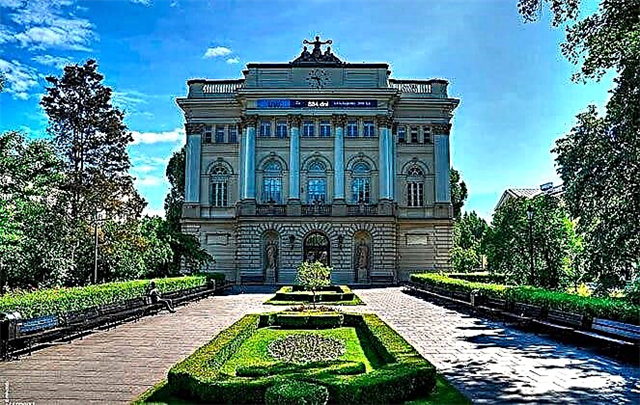South Korea is a successfully developing state in East Asia, open and friendly to visitors as long as it is about tourism. When the question of citizenship arises, the country's authorities put forward strict requirements and monitor their strict implementation.
Citizenship Law
South Korea's migration policy is governed by the Citizenship Law of December 13, 1997 (with changes and additions). Substantial amendments appeared in Korean legislation in 2010 on the issue of dual citizenship.
Citizenship Applicants:
- Children of South Korean citizens (regardless of place of birth);
- Persons who have entered into an official marriage with a Korean national;
- Ethnic Koreans living abroad and their descendants;
- Persons of Special Service to the Republic of Korea;
- Highly qualified specialists, large investors;
- Immigrants who have lived for a long time on the territory of the state, fluently speaking the Korean language, integrated into the South Korean society.

The law prohibits becoming a citizen:
- Persons who pose a threat to the security of the country, violators of state laws;
- Employees of a foreign army, intelligence and security personnel of a foreign state;
- Persons with an outstanding criminal record;
- Persons suffering from serious medical conditions or mental disorders.
Methods for obtaining citizenship
It is possible to acquire the citizenship of South Korea in several ways, strictly observing the requirements of the law.
By birth and origin
Children acquire citizenship in the following circumstances:
- Both parents are registered as citizens of the Republic of Korea at the time of the child's birth;
- One of the parents is a Korean citizen, with the documented consent of the other parent, a citizen of another country;
- The child's father passed away before his birth, but was a Korean citizen;
- The child was born in Korea by stateless parents;
- The child was found on the territory of the state unaccompanied by parents, guardians, official representatives.
By naturalization
You May Also Like
Korean immigration law provides for 2 types of naturalization:
- General naturalization applies to ordinary foreigners applying for citizenship on a general basis (the most popular method among citizens of the Russian Federation);
- Special naturalization affects persons of Korean origin and persons of special merit to the state.
Voluntary acceptance of citizenship in Korea requires the fulfillment of a number of conditions:
- Lifetime in Korea - at least 5 years;
- Age - over 19 years old (age of majority according to South Korean laws);
- Financial solvency, the presence of a permanent job, the provision of housing;
- Trustworthiness, law-abidingness, no criminal record;
- Knowledge of the Korean language and the basic realities of life in Korea.
Circumstances giving candidates the opportunity to naturalize in Korea on an accelerated basis - after 3 years in the country:
- The father or mother of a foreign citizen had a Korean passport before his death;
- The foreigner has previously voluntarily renounced Korean citizenship;
- The foreigner or his parents were born in Korea;
- A foreign minor is adopted by a South Korean citizen.
Special naturalization for those with outstanding abilities in sports, science, culture is carried out by Presidential Decree, exempts applicants from all requirements, but rarely takes place due to subjective assessment of achievements.
As a result of marriage
Marriage with a Korean citizen entitles you to a simplified Korean passport. You can naturalize after 3 years of family life, provided that you have permanently resided in Korea for at least 1 year.
The marriage is carefully checked for fictitiousness: the family must live together, lead a common life. The birth of children removes the migration authorities' suspicion of falsification of family ties.
Training and employment
Studying in Korean educational institutions, as well as the fact of official employment, do not give grounds for immediate citizenship, but are a condition for obtaining a student or work visa, which allows you to legally live in Korea for a long time.
The next step towards obtaining citizenship will be a request for a temporary residence permit, then - permanent residence. And only after living in the country for a sufficient period of time according to the legislation, it will be possible to start collecting documents for naturalization.
Through doing business, investing
South Korean legislation does not provide for the possibility of acquiring citizenship by investing in the economy, but it greatly simplifies the procedure for obtaining a permanent residence permit for large investors.
Businessmen who have invested in the national economy more than 500 thousand dollars and entered into a partnership agreement with an operating company in Korea, apply for an accelerated receipt of permanent residence. Further registration of citizenship is carried out in the usual manner.
Ethnic Korean Support Program
Former citizens of South Korea who previously left their historical homeland, as well as their descendants up to 3 tribes inclusive, have the right to simplify the acquisition of Korean citizenship. Applicants are required to document their Korean roots and demonstrate a high level of proficiency in the language.
Double citizenship
In 2010, the Law on Citizenship was amended with regard to the possibility of obtaining dual citizenship for certain categories of the population.
The relief touched on:
- Outstanding personalities;
- Children from multicultural families until they reach the age of majority;
- Ethnic Koreans over 65 years oldwho came to permanent residence.
The rest of the citizens of Korea will have to voluntarily give up their foreign passports.
While in the country, persons with dual citizenship are identified as citizens of Korea, are subject to state law, and are not entitled to the privileges of being a foreign citizen.
The procedure for obtaining citizenship
The process of accepting citizenship in South Korea is strictly regulated. To acquire citizenship of the country, you will need to go through an orderly procedure and submit a mandatory package of documents to the Immigration Center at the place of registration.

Special requirements
An applicant for Korean citizenship must enlist the support of at least one significant Korean citizen and provide a letter of recommendation from him.
The right of surety is possessed by:
- Members of the Congress, Parliament, Council of Education;
- Heads of municipalities;
- Officials of the Ministry of Justice;
- Judges, lawyers;
- Persons included in the management staff of educational institutions, professors;
- Directors, press representatives;
- Doctors of narrow specialties, veterinarians;
- Officials of large corporations;
- Participants in the social integration program.
To obtain citizenship, it is necessary to pass a written examination on the knowledge of the culture and traditions of the Republic of Korea (carried out in the form of testing in the Korean language) and successfully pass an oral interview, proving the conversational level of language proficiency and basic knowledge of regional geographic information.
Males of draft age should be prepared for the fact that, having acquired the status of a Korean citizen, they will need to serve in the Korean army.
Required documents
To obtain Korean citizenship, Russians will have to collect a solid list of documents:
- Application (filled in English or Korean);

- International passport;
- Foreigner's card;
- Photo of the established sample;
- Marital status documents;

- Documents confirming financial solvency (the applicant or his family members must have at least 60 million won in the bank account);
- Certificate of no criminal record in Korea and Russia;

- Official employment documents;
- Certificate of successful passing of the regional geography test;
- Letter of recommendation;
- Pledge of Allegiance to Korea.
Documents are translated into Korean with the obligatory designation of the translator's name, originals and copies are provided.
Step-by-step instruction
Stages of the citizenship acquisition procedure:
- Collection and submission of documents to the Immigration Center;
- Testing and interview;
- Consideration of the application, verification of information about the candidate by the Office for Refugees and Citizenship;
- Making a decision.
Cost and terms
Consideration of a petition can take term from 8 to 24 months.
The cost of the naturalization procedure will be 300k won... Restoration of the status of a citizen will cost the applicant 200,000 won.
Refusal to issue citizenship
If an incomplete package of documents is submitted to the migration service, as well as if the fact of fraud and falsification of documents is revealed, or important information is hidden, the issuance of citizenship will be refused.
Filing an appeal and re-applying for citizenship is not legally excluded, but rarely has a positive result.
Obtaining South Korean citizenship is not an easy procedure, the success of which depends entirely on the degree of integration into Korean society.











